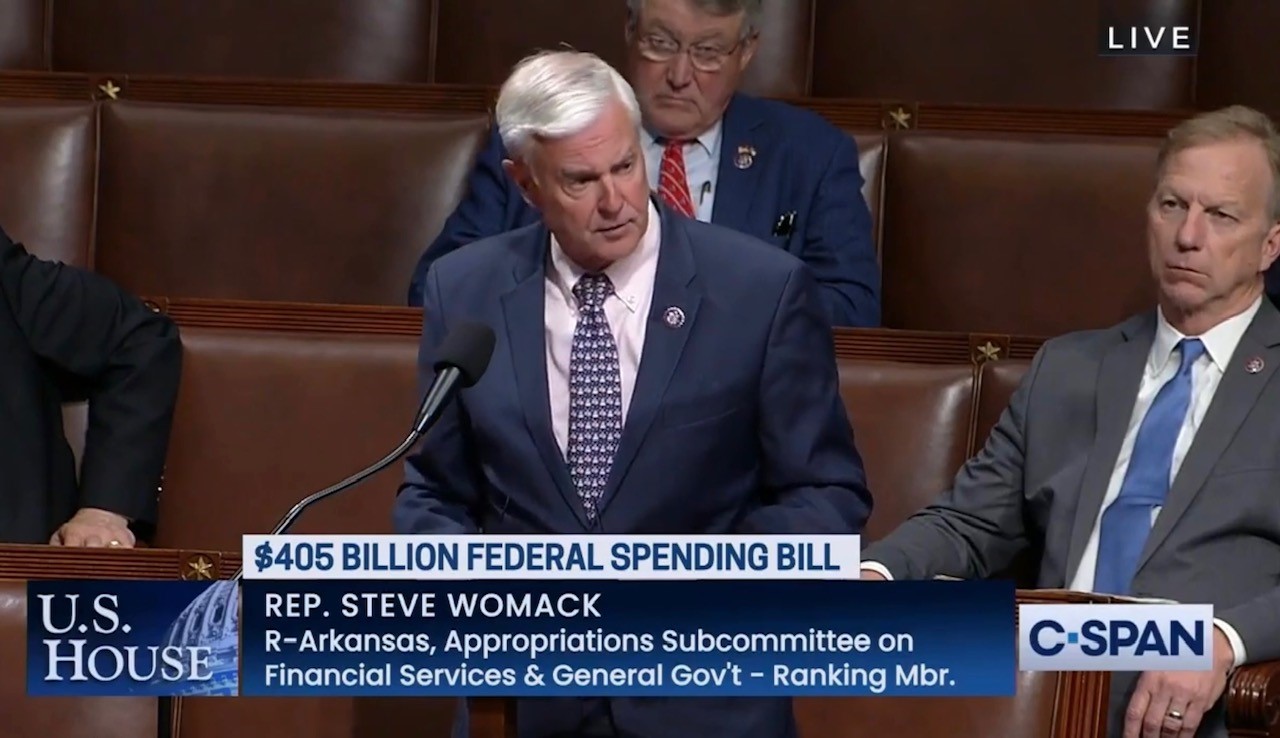Press Releases
FSGG Ranking Member Womack’s Appropriations Floor Remarks
Washington,
July 19, 2022
Washington, DC—July 19, 2022....Congressman Steve Womack (AR-3), a senior member of the House Appropriations Committee—where he serves as the Ranking Member of the Financial Services and General Government (FSGG) Subcommittee and also sits on the Defense and Transportation, Housing and Urban Development (THUD) Subcommittees—rose on the House floor to speak on Fiscal Year 2023 appropriations bills. His remarks outlined the fiscally irresponsible and unprecedented spending levels of the majority party’s proposal, noted the impact of rapid inflation, highlighted the need for budget and appropriations process reform, and called for House and Senate leaders to come together to amend the package and reach a bipartisan compromise. Watch Congressman Womack’s floor remarks here.
“I thank the Ranking Member for the time. I would have been here a little bit earlier, but previous commitments kept me from speaking during general debate. “I rise in opposition to this package of appropriations bills. “I am the Ranking Member of the Financial Services and General Government Appropriations Subcommittee, and I have a great deal of respect for my Chairman, Mike Quigley. We work well together, and I appreciate the hard work he and his team have put in trying to get a bill that we can come to agreement on. “However, the bill we are debating is packed with unjustifiable spending that ignores the government’s unsustainable fiscal trajectory and the historic level of inflation burdening all Americans. “And we should be fixing that, not making it worse. “As the pandemic wanes and inflation soars, I was hoping that we could begin reducing spending. Instead, the Financial Services division of this bill increases discretionary spending by over 17 percent. “Many programs in the bill get double-digit percentage increases, and some get triple-digit percentage increases. For example, the bill provides: “433 percent increase for election grants. “20 percent increase for the White House. “30 percent increase for the Federal Trade Commission. “$1 billion increase for the IRS, and “$1.6 billion increase for the GSA. “These increases are unconscionable when considering the U.S.’s historically high debt – now in excess of $30 trillion – and inflation over 9 percent. The combination of debt and inflation places a heavy burden on future generations of Americans. “We should be fixing that. “There are also several controversial policy changes included in the FSGG division, such as allowing D.C. tax dollars to fund abortions and removing the prohibition on federal employee health benefits funding for abortions. These policy changes are no-gos and make this bill and minibus as a whole dead in the water. “They'll have to be fixed if we're going to come to some agreement. “We need to continue the longstanding legacy riders and drop the poison pills. We also need a topline spending agreement that reduces the non-defense spending in the bill and funds national security at an appropriate level. “But maybe the larger question about this bill has more to do with how we came up with these topline numbers. “We allowed the four corners of leadership to dictate these topline numbers. They didn't come out of a budget process. And we have a budget committee over here whose purpose is, in part, to do that very thing. “But that didn’t happen. So, we kick out numbers that we won't agree to. Wasn’t through a budget process, where we could define our priorities—the emerging needs of our country—and come to some agreement through a legitimate budget process. “But that is not what happened here. So, it is long since time that we stop this process of doing deeming resolutions or burying topline numbers in rule bills and get back to the process that is laid out for us. And that is to do a budget resolution—both House and Senate—to get to some kind of agreement and then establish an appropriate appropriations process where we can do these bills individually. There are 12. And we're going to do six today, and then we're going to discuss six later, but we ought to be doing them individually. “And we ought to give the members of Congress an opportunity because it is our Article One responsibility. We need to be giving the members of Congress the ability to input on these bills and not just let the four corners of leadership decide what we're going to do or what we're not going to do. “So, while I oppose this package in its current form, I do look forward to working with my friend Mike Quigley on a bipartisan compromise, at least on the FSGG side. And then perhaps we can do that for the 12 bills completely and then get about the business of funding the government, which is part of our fundamental responsibility. “I do appreciate the time, Madam Ranking Member, and I yield back.” Congressman Steve Womack (AR-3) has represented Arkansas’s Third Congressional District since 2011. He is a member of the House Appropriations Committee. ### |

